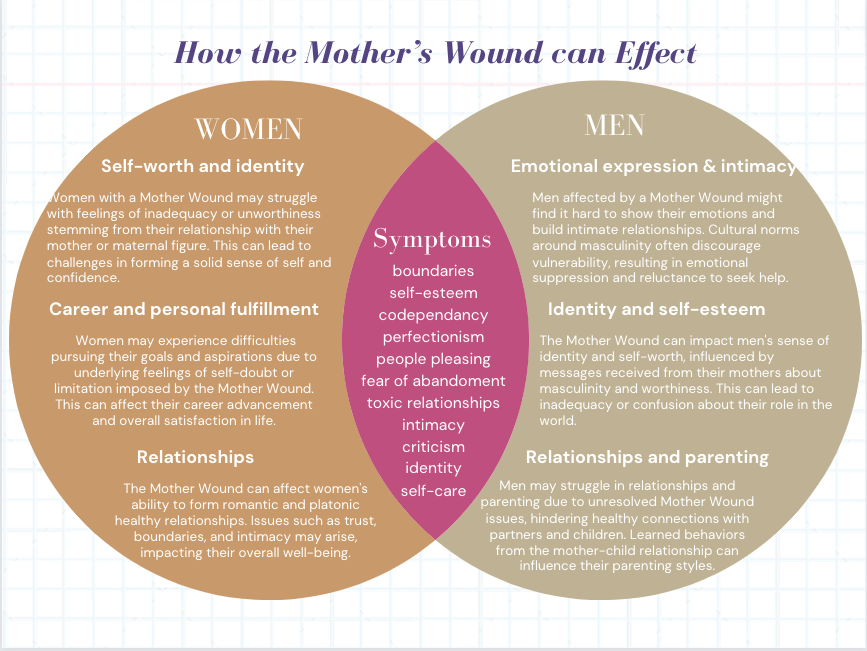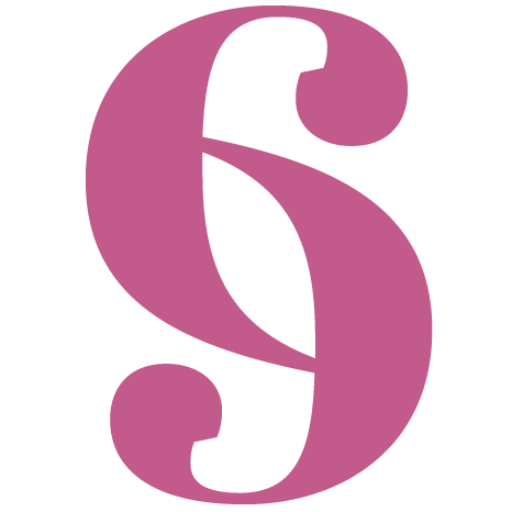Healing Your Mother Wound: Your Journey Starts Here
The Mother Wound refers to the emotional pain, trauma, and unresolved issues that can arise from the relationship between a person and their mother or maternal caregiver. This wound can stem from various sources, including maternal neglect, emotional abuse, unrealistic expectations, boundary violations, enmeshment, or unmet needs for nurturing and validation. Individuals with a Mother Wound may struggle with feelings of abandonment, inadequacy, low self-esteem, codependency, or difficulties in forming healthy boundaries and relationships.
While both the Mother Wound and the Father Wound involve challenges in the parent-child relationship dynamic, they can manifest differently due to the gender roles and belief systems of mothers and fathers in society. For example, the Mother’s Wound may often involve nurturing, emotional validation, and caretaking issues. At the same time, the Father Wound may center on themes of authority, validation of achievement, and the modeling of masculine identity. Similar to the Mother Wound, the Father Wound can originate from experiences such as emotional absence, physical absence, neglect, abuse, criticism, or a lack of positive male role modeling. Those with a Father Wound may grapple with identity, self-worth, trust, assertiveness, or intimacy issues.
It’s essential to recognize that individuals may experience both the Mother Wound and the Father Wound simultaneously or to varying degrees. Additionally, the impact of these wounds can extend beyond childhood and into adulthood, influencing patterns of behavior, romantic relationships, and emotional well-being.
Healing the Mother Wound delves into the intricate psychology of the mother-daughter relationship, exploring its profound impact on shaping our identities and emotional landscapes. From a young age, maternal figures play a pivotal role in our development, influencing everything from our beliefs and behaviors to our sense of self-worth and intimacy. Whether these figures are biological mothers, adoptive mothers, or other maternal figures such as older sisters, aunts, or grandmothers, their presence leaves an indelible mark on our psyches. However, this relationship is not always one of unconditional love and support; it can also harbor complexities, conflicts, negative feelings, and unresolved traumas that linger well into adulthood.
The Mother’s Wound as the emotional scars left by early experiences of rejection, neglect, or unavailability from the primary caregiver, usually the mother.
Dr. Sue Johnson, a leading expert in EFT (Johnson, 2019)
These wounds, whether stemming from neglect, abuse, or the inherent challenges of familial dynamics, can significantly impact our emotional well-being, healing process, and interpersonal relationships. Healing the Mother Wound requires deeply exploring these dynamics, including introspection like inner child work, empathy, and a willingness to confront painful truths usually best supported by mental health professionals. By unraveling the layers of our Mother Wound with compassion and understanding, we can reclaim ourselves, forge healthier connections with others, and embark on a positive healing journey.
How does a Mother Wound form?
Mother wounds can be a result of generational trauma that has gone undiagnosed. While the mother wound begins in childhood with patriarchal messages from mothers to daughters and via family dynamics, these mothers (for whatever reasons) seem to be unable to cope with everyday situations. A foundation for the mother to not fully understand or respect boundaries and assume codependency that can relieve them of responsibilities, duties, and accountabilities, where the mother will expect particular treatment as they feel is justified as ‘the Mother.’ This insidious behavior has left many feeling unable to identify what causes them distress or anxiety, often normalized or dismissed as a personality type. “Oh, that’s my mother.” The incriminating mother fails to validate other people’s feelings or rights to them. A concept that may be foreign to them ( to be more empathetic ) due to their unhealed trauma and or cultural and generational standards. The formation of a Mother Wound can frequently occur subtly and gradually, making it challenging to recognize and address. In many cases, the dysfunctional patterns within the mother-child relationship may be dismissed as typical family dynamics, further complicating the healing process.
For instance, maternal neglect or emotional unavailability may manifest subtly, such as a lack of affection, attention, or validation from the Mother. Maybe mom believed that showing affection would make a child weak – a lesson of strength that ultimately made a child vulnerable. Over time, these subtleties accumulate, leaving the child feeling chronically unseen or undeserving of love and unable to learn how to process emotion. Yet, compared to apparent physical abuse (nothing to see here, everything is “fine”), we now know the wound inside can be more substantial than you can see outside.
Criticism and Mother micro-managing
It is often disguised as well-intentioned guidance or discipline (for your good), making it difficult for the child to discern between constructive feedback and harmful criticism. Over time, internalized messages of not being “good enough” or needing to meet unrealistic expectations may become deeply ingrained, shaping the individual’s self-concept and worldview, not to mention the constant anxiety of self-esteem and doubt.
Culturally, it has been normalized and even expected to have an overbearing mother, particularly in families where enmeshment or over-involvement is seen as a right or some family closeness or love. Blurring boundaries between parent and child can lead to a lack of autonomy and independence in the child, even spawning a potentially unwanted codependent relationship. Yet these patterns may go unquestioned due to societal expectations or cultural norms surrounding family relationships.
Spotting a Mother’s Wound isn’t always easy, especially when others brush it off. It can make you feel invalidated or like you’re being gaslit. Comments like “But she’s your Mom, she’s just looking out for you” or “You should appreciate all she’s done” might seem harmless, but they can actually make things worse. They downplay your experiences and mess with your emotional well-being, making it tough to live your best life.
Despite these challenges, it’s essential to recognize that the effects of a Mother Wound are real and significant, regardless of how subtle or normalized they may seem. Healing from a Mother Wound involves recognizing and acknowledging the impact of maternal wounds, unraveling the layers of emotional pain and trauma, and reclaiming one’s sense of self-worth and autonomy.
Emotional Unavailability
Emotional unavailability among caregivers significantly impacts a child’s emotional development. When caregivers are physically distant or unresponsive to a child’s needs, it leads to confusion and insecurity. This lack of emotional responsiveness can also manifest as a failure to validate or acknowledge the child’s emotions, resulting in a sense of invalidation and diminished self-worth. Additionally, emotional unavailability may involve a caregiver’s reluctance to take responsibility for their actions or feelings, leaving the child feeling unheard and unsupported. These experiences of emotional neglect or inconsistency during childhood can have enduring effects well into adulthood and influence major life decisions later on.
The Creation of the Parentified Daughter / Good Girl
Parentification occurs when a daughter takes on the maternal role of her mother, effectively reversing their roles. This can happen when parents rely on their children to meet their physical and emotional needs, depriving the child of a normal childhood. Unfortunately, this early burden of responsibility forces the child to mature prematurely, leading to stress and hindering cognitive development as they navigate the emotional complexities of home.
This dynamic not only affects the child’s emotional well-being but also teaches them damaging lessons about self-esteem, boundaries, and dependency. As a result, the child may develop traits such as high self-esteem, a lack of boundaries, and feelings of shame while also forming codependent relationships ( think fixer or rescuer role) that can extend into their romantic partnerships.
In many cases, daughter-parentified daughters grow into high-achieving individuals and empathetic caregivers. While initially seen as peacemakers and problem-solvers, their kind-hearted natures may eventually lead to their being taken advantage of.
How does a Mother’s Wound Affect a Son?
The Mother Wound profoundly impacts men, shaping their emotional landscape and interpersonal connections. Dr. Wayne Dyer eloquently states in his book Your Erroneous Zones, “Our early relationship with our mothers lays the groundwork for our internal beliefs about ourselves and the world around us, influencing every aspect of our lives.”
For men, the Mother Wound may manifest in various ways, from struggles with self-esteem and emotional expression to difficulties forming intimate relationships. Growing up with a distant or critical mother can leave men feeling disconnected from their emotions and uncertain of their worthiness. Moreover, societal expectations of masculinity may compound these feelings, perpetuating a cycle of stoicism and emotional suppression.
In romantic relationships, the Mother Wound can lead to patterns of codependency, fear of intimacy, and challenges in establishing healthy boundaries. Additionally, unresolved issues with the mother may hinder men’s ability to assert themselves confidently in their careers and personal lives.
Through self-awareness, forgiveness, and personal growth espoused by Wayne Dyer, men can begin to heal the Mother Wound and reclaim their sense of self-worth and empowerment. By acknowledging the impact of their early experiences and cultivating self-compassion, they can transcend the limitations of the past and forge more fulfilling and authentic connections with themselves and others.
Inner Mother
Viewing the concept of the “Inner Mother” through the lens of psychology unveils the profound impact our relationship with our Mothers has on our self-perception and inner dialogue. According to renowned psychologist and author Dr. Sue Johnson, “Our inner dialogue is a reflection of the messages we receive from our primary caregivers, particularly our mothers.” (Johnson, 2019)
In her groundbreaking book “Attachment Theory in Practice: Emotionally Focused Therapy (EFT) with Individuals, Couples, and Families,” Dr. Johnson delves into how our internalized representations of our mothers shape our inner worlds. She explains that the Inner Mother often begins as a replica of our external mother, embodying critical voices and negative narratives that fuel self-doubt and shame.
Surviving childhood challenges and navigating the complexities of adolescence are integral parts of this developmental process. However, as adults, we can heal and transform our Inner Mother (the internal critic). By nurturing ourselves in ways our mothers may have been unable to and implementing techniques like inner child healing, self-care strategies, and therapy, we can give ourselves what our mothers could not: a chance to be heard and seen. Reclaiming our Inner Mother or inner voice, critic, and narrative and fostering a nurturing relationship with ourselves pave the way for profound healing and personal growth. And gradually shift our internal dialogue towards self-compassion, empowerment, and love.
Frequently Asked Questions
What is a mother wound?
The Mother Wound isn’t something you’ll find in a diagnostic manual, but it’s real enough to those who’ve felt its effects. This deep-seated feeling of being abandoned and not good enough makes it challenging to connect with and make sense of your emotions. When you look at it through the lens of complex PTSD (C-PTSD), the Mother’s Wound becomes a symbol of the emotional turmoil caused by growing up in a challenging caregiving environment, especially within the mother-child relationship.
What is the spiritual meaning of the mother wound?
From the perspective of spiritual luminaries like Donna Hay or Gabrielle Bernstein, the Mother Wound becomes a sacred invitation for healing and transformation, transcending clinical labels to reveal deeper spiritual truths. Gabrielle Bernstein beautifully articulates in her book “The Universe Has Your Back,” “Our relationship with our mothers is a reflection of our relationship with the divine feminine, guiding us to awaken to our true essence and purpose.”
Seen through this spiritual lens, the Mother Wound signifies an opportunity to reconnect with the nurturing, life-affirming energy of the divine feminine, embodied by both earthly mothers and the universal mother archetype. It speaks to the soul’s journey of healing past wounds and reclaiming its innate worthiness and belonging.
Through meditation, prayer, inner child, and forgiveness work, individuals can embark on a spiritual journey of healing and self-discovery, guided by the wisdom and love of the divine feminine. By embracing the principles of surrender, faith, and self-love, they can transmute the pain of the Mother Wound into a source of empowerment and spiritual growth, aligning with their soul’s purpose and the greater flow of the universe. How does a mother wound show up in a woman?
A woman often overlooks their true story as she cannot see the real story behind closed doors. Mother Wounds can manifest as phobia and anxiety disorder, repressed emotions, disorderly eating, and substance abuse. 20 Mar.

Women:
– Self-worth and identity: Women with a Mother Wound may struggle with feelings of inadequacy or unworthiness stemming from their relationship with their mother or maternal figure. This can lead to challenges in forming a solid sense of self and confidence.
– Relationships: The Mother Wound can affect women’s ability to form romantic and platonic healthy relationships. Issues such as trust, boundaries, and intimacy may arise, impacting their overall well-being.
– Career and personal fulfillment: Women may experience difficulties pursuing their goals and aspirations due to underlying feelings of self-doubt or limitation imposed by the Mother Wound. This can affect their career advancement and overall satisfaction in life.
Men:
– Emotional expression and intimacy: Men with a Mother Wound may struggle to express their emotions openly and form close, intimate connections. Societal expectations of masculinity may discourage vulnerability, leading to emotional suppression and difficulty in seeking support.
– Identity and self-esteem: The Mother Wound can impact men’s sense of identity and self-worth, influenced by messages received from their mothers about masculinity and worthiness. This can lead to inadequacy or confusion about their role in the world.
– Relationships and parenting: Men may face challenges in their relationships and parenting journey, as unresolved issues from the Mother Wound can affect their ability to connect with their partners and children healthily. Patterns of behavior learned from the mother-child relationship may also manifest in their parenting styles.
Shared attributes:
Struggles with self-worth: Due to the mother wound, both men and women may experience feelings of unworthiness or inadequacy, which can impact their confidence and sense of value.
– Difficulties in intimacy: The Mother Wound can hinder both genders’ ability to form and maintain close, intimate connections with others, leading to challenges in trust and vulnerability.
– Emotional expression: Men and women may struggle to express their emotions openly and authentically, influenced by societal norms and family dynamics surrounding emotional expression.
Although the manifestations of the Mother Wound may differ between men and women, shared attributes include struggles with self-worth, intimacy, and emotional expression. Healing involves acknowledging these wounds and seeking support for personal growth and healing, regardless of gender.
What are the Mother’s Wound symptoms?
Identifying the presence of a Mother Wound involves recognizing specific symptoms or patterns in one’s thoughts, feelings, and behaviors. Here are some common indicators that may suggest the presence of a Mother Wound:
1. Difficulty setting boundaries: Struggling to establish and maintain healthy boundaries in relationships, like justifying a situation or being overly giving (empathetic), often leads to feeling taken advantage of or overwhelmed.
2. Low self-esteem: Persistent feelings of unworthiness, inadequacy, or self-doubt, often stemming from early experiences of rejection or criticism from the mother figure.
3. Codependent tendencies: Relying excessively on others for validation, approval, or a sense of identity, with difficulty in asserting one’s own needs and desires.
4. Fear of abandonment: A deep-seated fear of rejection or abandonment can lead to clinginess or anxiety in relationships and an inability to trust others. This fear can be expressed in generosity, giving to keep someone close.
5. Difficulty expressing emotions: The child struggles with identifying, describing, or regulating emotions, often due to a lack of emotional attunement or validation from the mother figure. The child usually runs away or does not address conflicts or hard feelings, returning to the state of not being seen or heard.
6. Perfectionism: Setting unrealistically high standards for oneself and others, driven by a fear of failure or a need to prove one’s worthiness.
7. People-pleasing: Prioritizing others’ needs and desires over one’s own, seeking external validation and approval to feel valued and accepted.
8. Pattern of toxic relationships: Repeating unhealthy relationship patterns characterized by emotional manipulation, control, or abuse, mirroring dynamics from the mother-child relationship.
9. Avoidance of intimacy: Difficulty forming close, trusting connections with others, often due to fear of vulnerability or abandonment.
10. Chronic self-criticism: Engaging in harsh self-judgment and negative self-talk, internalizing critical messages from the mother figure.
11. Identity issues: Uncertainty or confusion about one’s sense of self, including values, beliefs, and life goals, stemming from a lack of validation or affirmation from the mother figure.
12. Difficulty mothering oneself: Struggling to nurture and care for oneself compassionately and lovingly, often perpetuating self-destructive patterns or behaviors.
It’s essential to understand that experiencing one or more symptoms doesn’t automatically mean you’re dealing with a Mother Wound. However, if these patterns resonate with you, reaching out for support from a therapist or counselor trained in attachment theory and trauma-informed care could be beneficial. This process may help uncover underlying wounds from the mother-child relationship that haven’t been fully recognized or understood. It’s a journey that requires time, life experience, and a willingness to explore and understand oneself. Take care, and always treat yourself with love.





